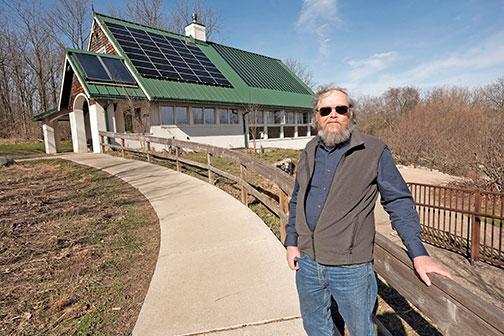A subcommittee of Ann Arbor’s Energy Commission is considering requiring homeowners to undertake an energy audit when they put their house up for sale. The “Time of Marketing Ordinance” would be modeled after programs in Portland, Oregon; Austin, Texas; and Chicago.
Josh MacDonald, the city’s sustainability and innovations energy coordinator, emphasizes that the proposal is in the “exploratory phase” and the city is seeking feedback in shaping it. But the people who would be most directly affected are already riled up. The subcommittee “assumed we would be behind it,” says Tracy Rose, a member of the board of directors of the Ann Arbor Area Board of Realtors (AAABOR). “We came in and had a very negative response because we see this as a burden on sellers.”
Energy commission chair Wayne Appleyard says that the point of sale is the best time to invest in energy improvements, because the cost can be rolled into the buyer’s mortgage. A presale audit, he says, “is a valuable tool for both the purchaser and for the community as a whole in reducing its greenhouse gas emissions.”
Based on the U.S. Department of Energy’s Home Energy Score (HES), the audits rate a home’s energy efficiency on a scale of one to ten and outline ways to improve it. Time of marketing ordinances typically require including HES scores in the Realtors’ Multiple Listing Service.
MacDonald compares HES scores to the EPA mileage ratings displayed on new-car window stickers. The rating “really helps potential buyers assess how they want to proceed going forward,” he says. And any improvements made would both benefit the environment and save the buyer money on their utility bills.
The Realtors see headaches. “This is something that gets placed on the seller at a very trying time,” says Tom Renkert, the AAABOR’s chief executive officer. If the city is “truly interested in houses being more energy efficient, why not incentivize people living here?” he asks. “Our recommendation is that it be an incentive program offered to any Ann Arbor resident.”
But incentives would cost the city money. Appleyard says part of the appeal is that audits could change behavior without requiring much city investment or staff time. Based on costs in other cities, he estimates an HES audit would cost sellers between $150 and $200.
Adam Carr, owner of Washtenaw Blower Door Services, which provides energy efficiency testing for new homes and additions, doubts that–his fees for a comprehensive energy audit average $350-$400. And Carr points out that there currently are no HES contractors within fifty miles of town. (MacDonald says he’s reaching out to groups that could train those who are interested.)
Even if there were enough contractors, Carr is skeptical of the ordinance’s potential. Michigan’s financial incentives to improve energy efficiency “pale in comparison to the rest of the country,” he says–“and this work costs a lot of money.”
Both DTE and Consumers Energy provide rebates for energy-efficiency work. A Consumers spokesperson says that includes LED lightbulbs, insulation, new windows, A/C tune-ups and replacements, furnace tune-ups and replacement, and more. Consumers will also perform a free “Home Energy Analysis” for its gas- and gas-and-electric customers, and plans to include electric-only customers next year. But that analysis doesn’t include an HES score.
The energy commission can recommend an ordinance, but city council would have to pass it. That’s not a given. The “back to basics” majority elected last year appears less interested in environmental initiatives. Members have said they don’t feel bound by prior votes to dedicate nearly $900,000 a year to fighting global warming (see Up Front, p. 11). A poll they commissioned found the issue wasn’t a top priority for residents, either.
The audit ordinance could be the first big test of the new majority’s environmental stance.


